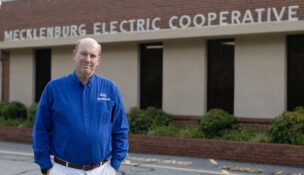Tech researchers aim to transform power grid
Paul Bibeau //January 30, 2023//
Across the American landscape about 3,000 more wind turbines have popped up every year since 2005, and more than 2.7 million homes in the U.S. now sport solar panels.
The power grid also is transforming, but the system is still better suited to centralized coal-fired plants, not widely dispersed sources of renewable energy.
A four-person Virginia Tech team wants to change that.
In September 2022, the National Science Foundation awarded the group a $1.5 million grant to help design the components of this greener grid, a four-year project.
Yuhao Zhang, head of the project and an assistant professor in Virginia Tech’s Bradley Department of Electrical and Computer Engineering, says the team will build new switches that can control the flow of electricity from a wide variety of different energy sources.
“We’re going to explore the use of a new semiconductor material, which has superior … electrical properties over silicon,” he says. The switches will be triggered by light signals rather than electricity, making them quicker and more reliable.
“[It’s] gonna basically give us a smarter grid,” says assistant professor Christina DiMarino, another member of the team, along with assistant professors Dong Dong and Xiaoting Jia. DiMarino says the grid will be more resilient during outages as well.
Zhang’s specialty is in semiconductor research; he will experiment with new materials and devices in the system. DiMarino studies power electronics packaging, the “black boxes” of epoxy material that house multiple computer chips.
Dong will create new switches that react to light signals. He says the current switches in power grids transmit signals with electricity, which can create electromagnetic interference.
“We can make the entire system more efficient,” Dong says, “and you also want to make the system smaller, compact and eventually [have a] much lower cost.”
Zhang says the Tech team plans to create proof-of-concept prototypes of the switches that could be installed into the grid. He also says the project will help identify what challenges industry leaders will face in transforming power grids with the new technology, as well as how long such a shift would take.
The team will add research from their project to undergraduate and graduate courses, so Virginia Tech engineering students will have a front-row seat to what could be the birth of the next generation of power technology.
i















